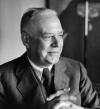Crispin as hermit, pure and capable,
Dwelt in the land. Perhaps if discontent
Had kept him still the pricking realist,
Choosing his element from droll confect
Of was and is and shall or ought to be,
Beyond Bordeaux, beyond Havana, far
Beyond carked Yucatan, he might have come
To colonize his polar planterdom
And jig his chits upon a cloudy knee.
But his emprize to that idea soon sped.
Crispin dwelt in the land and dwelling there
Slid from his continent by slow recess
To things within his actual eye, alert
To the difficulty of rebellious thought
When the sky is blue. The blue infected will.
It may be that the yarrow in his fields
Sealed pensive purple under its concern.
But day by day, now this thing and now that
Confined him, while it cosseted, condoned,
Little by little, as if the suzerain soil
Abashed him by carouse to humble yet
Attach. It seemed haphazard denouement.
He first, as realist, admitted that
Whoever hunts a matinal continent
May, after all, stop short before a plum
And be content and still be realist.
The words of things entangle and confuse.
The plum survives its poems. It may hang
In the sunshine placidly, colored by ground
Obliquities of those who pass beneath,
Harlequined and mazily dewed and mauved
In bloom. Yet it survives in its own form,
Beyond these changes, good, fat, guzzly fruit.
So Crispin hasped on the surviving form,
For him, of shall or ought to be in is.
Was he to bray this in profoundest brass
Arointing his dreams with fugal requiems?
Was he to company vastest things defunct
With a blubber of tom-toms harrowing the sky?
Scrawl a tragedian's testament? Prolong
His active force in an inactive dirge,
Which, let the tall musicians call and call,
Should merely call him dead? Pronounce amen
Through choirs infolded to the outmost clouds?
Because he built a cabin who once planned
Loquacious columns by the ructive sea?
Because he turned to salad-beds again?
Jovial Crispin, in calamitous crape?
Should he lay by the personal and make
Of his own fate an instance of all fate?
What is one man among so many men?
What are so many men in such a world?
Can one man think one thing and think it long?
Can one man be one thing and be it long?
The very man despising honest quilts
Lies quilted to his poll in his despite.
For realists, what is is what should be.
And so it came, his cabin shuffled up,
His trees were planted, his duenna brought
Her prismy blonde and clapped her in his hands,
The curtains flittered and the door was closed.
Crispin, magister of a single room,
Latched up the night. So deep a sound fell down
It was as if the solitude concealed
And covered him and his congenial sleep.
So deep a sound fell down it grew to be
A long soothsaying silence down and down.
The crickets beat their tambours in the wind,
Marching a motionless march, custodians.
In the presto of the morning, Crispin trod,
Each day, still curious, but in a round
Less prickly and much more condign than that
He once thought necessary. Like Candide,
Yeoman and grub, but with a fig in sight,
And cream for the fig and silver for the cream,
A blonde to tip the silver and to taste
The rapey gouts. Good star, how that to be
Annealed them in their cabin ribaldries!
Yet the quotidian saps philosophers
And men like Crispin like them in intent,
If not in will, to track the knaves of thought.
But the quotidian composed as his,
Of breakfast ribands, fruits laid in their leaves,
The tomtit and the cassia and the rose,
Although the rose was not the noble thorn
Of crinoline spread, but of a pining sweet,
Composed of evenings like cracked shutters flung
Upon the rumpling bottomness, and nights
In which those frail custodians watched,
Indifferent to the tepid summer cold,
While he poured out upon the lips of her
That lay beside him, the quotidian
Like this, saps like the sun, true fortuner.
For all it takes it gives a humped return
Exchequering from piebald fiscs unkeyed.






